Veterans Program for Politics and Civic Engagement – Success Stories
Molly Mae Potter
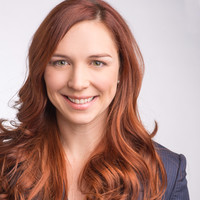 Molly Mae Potter was a flight test engineer in the U.S. Air Force. She planned on a long career. Then in 2010, she was wounded in Afghanistan and no longer able to fly. The day she was honorably discharged, she felt lost. “I quite literally didn’t know what to do with the rest of my day. I didn’t know what to do with my life. And I just froze. And froze about 20 feet from the outside of the gate. I was like, what does this mean?”
Molly Mae Potter was a flight test engineer in the U.S. Air Force. She planned on a long career. Then in 2010, she was wounded in Afghanistan and no longer able to fly. The day she was honorably discharged, she felt lost. “I quite literally didn’t know what to do with the rest of my day. I didn’t know what to do with my life. And I just froze. And froze about 20 feet from the outside of the gate. I was like, what does this mean?”
Potter had a skillset in the military that she didn’t think translated to civilian employment. “I tested airplanes and I was very narrow on that. I didn’t see the value of the other core competencies that I had gained in the military and how they could relate into my civilian life,” she says. Dell technologies did finally see the value in her experience and hired her. “They gave me the confidence to reach out and to do more with it.” Now in a better place professionally and mentally, Potter says she feels like she may openly talk about struggles of transitioning veterans. Like mental health, healthcare, and unemployment. “There’s a lot of things that I experienced getting out of the military and transitioning, that directly relate to national policy right now.”
Though Potter has always been interested in government, that interest wasn’t necessarily rooted in running for politics. Before VPPCE, she connected with the veteran’s community in Austin, Texas because it felt like it was a tangible connection to her previous role in the military. She was determined to help create policies that would improve the post-service lives for veterans like her. Potter said if it wasn’t for her family and friends, she would have been homeless during her transition. She ended up working at a running shoe store part-time making $11.00 an hour. “That’s the only employment I could find. And here I was like a test pilot school graduate, an engineer with a master’s degree and I couldn’t find employment,” she says.
She got involved with local veteran politics and served on the veteran’s commission for Austin, becoming an active member. That led to more involvement with local politics. She also participated in a program called Ms. Veteran America, a national platform that advocates for women veterans experiencing homelessness and to advocate on their behalf. She won the title.
As Ms. Veteran America, she spent a year working with communities, nonprofits, and people that drive policy for homelessness and veteran’s affairs. “I realized after that I had a voice—that people would listen,” she says. “I also realized that most people that were making the policy related to women veterans were not veterans and not women. And I felt like I wanted to start having a seat at the table.”
Potter says VPPCE has given her the foundation to take that seat at the table. “I had no idea what it meant to run for office or to be a part of policymaking at an official level,” says Potter. Participants work with other veterans with first-hand experience running for office, experts in the field, and faculty from the Maxwell School to deliver instruction throughout our programs. Potter says the program brings likeminded veterans together, and in doing so can bring unity to the divisive politics that exists currently in the United States. “I didn’t even know you needed a campaign plan beforehand,” says Potter. “And by the end I’m feeling like, ‘Oh man, maybe I can do this. Here’s how I can do it,’” Potter says. Potter created a campaign plan and a winning pitch. “I thought to myself, maybe this just became real.”
Today, Potter isn’t committed to a single vision of what her work in politics will look like. “I feel service will take you wherever your heart pulls you. The Air Force pulled on my heart after college, and that’s where I went,” she says. “There’s a lot that pulls at the heartstrings here in Austin.”
Alex Goff
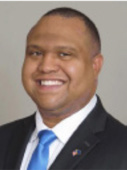 Alex Goff didn’t vote until after leaving the Marine Corps. He felt disconnected from his home community in Mississippi and didn’t feel like he had a voice. However, after his eight year service in the Marine Corps, he learned more about politics and paid closer attention to pertinent issues. After leaving the military, he joined a local union in 2015 and participated in a demonstration at his state’s legislature. “I felt so out of place, like I didn’t belong,” says Goff. His apprehension about politics lessened as he continued to be active. “I began to find my voice and find my presence. And I realized that it was important for me to advocate because of my life experience,” he says. “The number one thing that the Marine Corps taught me is that things can look challenging at the outset, but if you come in with a good plan and a good strategy, you can do amazing things.”
Alex Goff didn’t vote until after leaving the Marine Corps. He felt disconnected from his home community in Mississippi and didn’t feel like he had a voice. However, after his eight year service in the Marine Corps, he learned more about politics and paid closer attention to pertinent issues. After leaving the military, he joined a local union in 2015 and participated in a demonstration at his state’s legislature. “I felt so out of place, like I didn’t belong,” says Goff. His apprehension about politics lessened as he continued to be active. “I began to find my voice and find my presence. And I realized that it was important for me to advocate because of my life experience,” he says. “The number one thing that the Marine Corps taught me is that things can look challenging at the outset, but if you come in with a good plan and a good strategy, you can do amazing things.”
Goff recently participated in the VPPCE program. Goff especially liked guest speaker Michael Nutter, former mayor of Philadelphia, “I was really engaged with what he was presenting and some of the ideas and concepts specifically around leadership,” he said. Goff appreciated being able to work with other veterans and members of military families in a non-partisan environment. Goff
“And, ultimately politics is about relationships as well. The opportunity just to meet new people and talk to different people and see what’s happening across the country, I think that’s important. I would definitely recommend this program to veterans across the country.”
says while there are several programs throughout the country that train people to run for political office, the experience of being in a course with veterans could not be matched. Goff thought the non-partisan discussion of different veteran experiences, perspectives and opportunities facilitated creative problem solving and interesting connections. “And, ultimately politics is about relationships as well. The opportunity just to meet new people and talk to different people and see what’s happening across the country, I think that’s important. I would definitely recommend this program to veterans across the country.”
Today, he has been appointed by his state’s governor to serve as an advisor to the vocational rehabilitation commission. His office works with individuals who have mental and physical disabilities to find employment. He also serves on his city neighborhood advisory board, which incorporates community feedback into upcoming projects like housing, potential businesses, and road construction. He feels like his experience makes him an effective advocate.
Politics allows Goff to be an emphatic leader and apply lessons he learned serving and transitioning from active duty. While he served, Goff said Marines could count on their allowances for housing, food, even uniforms. Outside of the military, veterans must learn how to budget, something Goff says he struggled with after leaving the military. Though a challenge, one of the first bills Goff worked on (in 2017) was a bill about individuals disclosing conflicts of interest before allowing people to invest. “I thought about all the military veterans who come out with some money,” said Goff. He feels a sense of accomplishment when taking care his community. Goff says, “Being able to collaborate and lift other people up is oftentimes what I find most rewarding.”
Jennifer Kaaoush
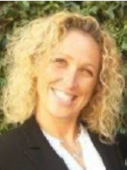 Veteran and military spouse Jennifer Kaaoush served on active duty in the U.S. Army. Kaaoush is also from a family legacy of military service. She was born in Korea while her parents were enlisted and lived in Germany as a child.
Veteran and military spouse Jennifer Kaaoush served on active duty in the U.S. Army. Kaaoush is also from a family legacy of military service. She was born in Korea while her parents were enlisted and lived in Germany as a child.
Her global sensibility has served her well over the past few years, as her family was assigned to U.S. embassies in Jordan and Qatar. At the embassy, Kaaoush took a position as a community liaison. The community liaison’s job is to support and advocate for the service member’s families at the embassies. It demanded being knowledgeable and helping institute policy changes if family members needs weren’t being met. This experience helped her develop a sense of intuition and emotional intelligence. She learned to be aware when people struggled to vocalize their challenges. Kaaoush learned to ask questions and dig deeper, having candid conversations while maintaining confidentiality. Her experience in other cultures and advocating on behalf of others led her to exploring the possibility of running for office.
Now that she has returned stateside, she recently completed the VPPCE. “I just have always had a [service mindset]. Certainly, some of it came from the military,” says Kaaoush. “I have always wanted to help people and somewhere along the way, I figured out that people who make legislation [for] their communities can really do a lot to help people,” she says. “My dad was a first sergeant and he always was in a command position. You take care of your people around you. And in politics, you can take care of a lot more people. It seems like a really great way to do the most good.”
One of the biggest takeaways [from VPPCE] for Kaaoush was there is a large toolbox for someone looking to run. “We had an assignment at the end to do a presentation on like a mock campaign. I think they really did it perfectly because it forced me to really think about my campaign that I would run, and what things I needed specifically for my situation.” Kaaoush credits the program for helping improve how she communicates ideas and making the idea of running for office less conceptual.
Kaaoush sees a future where she runs for political office, and in a best-case scenario can see herself running for U.S. Senate. Combined with her experience living abroad in a military family, VPPCE has given her skills to take the next steps toward a meaningful career in politics, no matter what office she decides to run for. “I have clear values and an understanding of how these are things that I stand for. I know how to speak about them, especially if I am in a situation where the person I might be running against does not agree. It took something that was an idea and made it tangible.”
Jonathan Sym
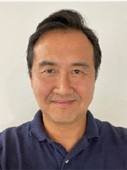 Jonathan Sym is a commander in the U.S. Navy Reserve. He’s served in the Navy for 22 years. His most recent deployment was in 2018 where he served as chief of staff in special operations command while operating in North and West Africa. “It was an amazing tour, the best tour I have ever had.” In Africa he served with Army Rangers, Marine Raiders, and Navy Seals. This was not the first time he’s served in a joint operation. His first deployment also involved service members from multiple branches. “And to this day, I’m still friends and chatting, giving people a hard time about their service still today after 22 years.” Sym says these relationships are a testament to the kinds of bonds and mutual respect people gain through serving together. “You get into these difficult situations with people in the military and they become lifelong friends.”
Jonathan Sym is a commander in the U.S. Navy Reserve. He’s served in the Navy for 22 years. His most recent deployment was in 2018 where he served as chief of staff in special operations command while operating in North and West Africa. “It was an amazing tour, the best tour I have ever had.” In Africa he served with Army Rangers, Marine Raiders, and Navy Seals. This was not the first time he’s served in a joint operation. His first deployment also involved service members from multiple branches. “And to this day, I’m still friends and chatting, giving people a hard time about their service still today after 22 years.” Sym says these relationships are a testament to the kinds of bonds and mutual respect people gain through serving together. “You get into these difficult situations with people in the military and they become lifelong friends.”
Sym’s camaraderie with other branches in part led him to the Veterans Program for Politics and Civic Engagement (VPPCE). Sym’s neighbor and retired U.S. Army officer Raymond Wong recently participated in this collaboration between Syracuse University’s Institute for Veterans and Military Families (IVMF) and the Maxwell School of Citizenship and Public Affairs. Wong told him about VPPCE’s overview and actionable strategies for running for political office. Wong told Sym he should apply if he ever decided to run for office. “Though we are on opposite sides of the political fence, we always have amazing discussions about things,” says Sym. Taking Wong’s advice, Sym completed VPPCE with the intention to learn everything he could for a potential future race.
“I am just a frustrated average Joe,” says Sym. “As a small business owner, a Navy reservist, and as a father of two young kids in public schools, I see what 2020 has done.” Sym said he found himself feeling powerless and simply venting to like-minded friends wasn’t enough. “They didn’t change policy, they didn’t change legislation.”
When Sym was recently contacted about exploring the possibility of running for a local county race, he felt like he needed to act. “I just couldn’t stay on the sidelines anymore,” he says. “The timing of completing this course and candidacy was serendipitous,” says Sym. “I’m leaning in now a lot on those lessons learned, I’m going back checking my notes,” says Sym. He combs his notes for what he calls “nuggets of gold,” helping him recall the “ah-ha” moments he had in VPPCE and using it in his campaign.
The same sense of mutual respect and admiration Sym described about members of other branches also extended to veteran participants with different political affiliations. “I don’t know if it’s bipartisan or nonpartisan, but it was helpful for everyone,” says Sym. He looks forward to connecting with other members of his VPPCE cohort and assisting them in situations they need from an outside perspective. For example, a Democrat or Republican can connect with people across the aisle running in a deeply red or blue area. He felt the lecturers and guest speakers, were insightful and accessible regardless of where people land on the political spectrum. “I wish it didn’t have to end quite frankly,” he says.
VPPCE has given Sym a new level of confidence going into his first political race. Sym says the IVMF and Maxwell program was intense enough to deliver the core elements of what people need to understand when they’re running for any type of office. “These fundamentals were invaluable. I’m a big fan of the program, a big supporter of the program, and I recommend VPPCE to anybody that’s even thinking about running.”
Elizabeth Hallgren
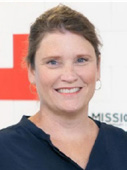 Elizabeth Hallgren was actively involved in her military community supporting other military spouses and families over the course of her husband’s 30-year military career. She lived in nine different military posts including two assignments in Germany. After Hallgren’s husband retired from the U.S. Air Force, she missed working to improve her community and looked for new ways to be involved civically.
Elizabeth Hallgren was actively involved in her military community supporting other military spouses and families over the course of her husband’s 30-year military career. She lived in nine different military posts including two assignments in Germany. After Hallgren’s husband retired from the U.S. Air Force, she missed working to improve her community and looked for new ways to be involved civically.
VPPCE empowers veterans and military spouses like Hallgren by explaining the basics of running for and holding political office. It covers the basic frameworks of an election and how to do a self-assessment in preparation for a career in politics. “I thought the program was really informative,” Hallgren said. “They had a wide range of speakers that looked at all the different ways you could be engaged. I learned a lot about the background of politics that I didn’t know before,” she said.
Hallgren said VPPCE gave her the tools to evaluate, manage, and run for an elected office. “What it did for me is it introduced me to what I don’t know, so that I could dive deeper on those areas,” Hallgren says. “Whether that was the individual faculty itself or resources that were talked about in the sessions, I feel like I now have clearly identified areas that I know that I need to learn more about. It felt like it was a really good overview and a place to start.”
Now finally rooted in her family’s adopted hometown of Omaha, she is using what she learned in VPPCE to be engaged in her new community. Hallgren now serves on a governor’s committee for women’s health and is involved with her local Rotary Club. “I’ve always felt like I had a responsibility to make wherever I was living better. I wanted to kind of equip myself with tools to make that community better. And I felt like this program gets that,” says Hallgren.
Hallgren says VPPCE helped her think more carefully on the timing of when to run and what office to run for. It also inspired her to branch out. “I volunteered to be on the governor’s legislative committee whereas before I might’ve been chosen to be on the education committee,” she says. “Because now I am able to advocate for different legislation going through the state unicameral. That’s one of the outcomes that I’ve had from this.” Hallgren plans to use her experience in the legislative committee as an example she can then point back to if she decides to run in the future. “This experience will say I’ve worked on bipartisan committees to impact legislation. And that’s not something that I would have thought about without the VPPCE program.”
